Unit 503: Wider Professional Practice and Development Report
VerifiedAdded on 2023/06/08
|13
|4066
|363
Report
AI Summary
This comprehensive report, focused on Unit 503: Wider Professional Practice and Development in Education and Training, delves into various aspects of professional development within the context of Human Resource Management (HRM). It begins by defining professionalism and dual professionalism, exploring how professional values influence HRM practices. The report then examines factors impacting educational policy, including political, social, and economic influences, and evaluates key aspects of the education sector. A case study analyzes the roles of stakeholders and external bodies in learning, emphasizing accountability and the importance of partnerships. An impact analysis assesses the influence of current educational policies on curriculum and practice. Finally, an analytical report evaluates quality improvement and assurance processes, including self-assessment, self-evaluation, and the identification of areas for improvement in learning programmes. The report underscores the interconnectedness of these elements in fostering effective education and training within the HRM field.
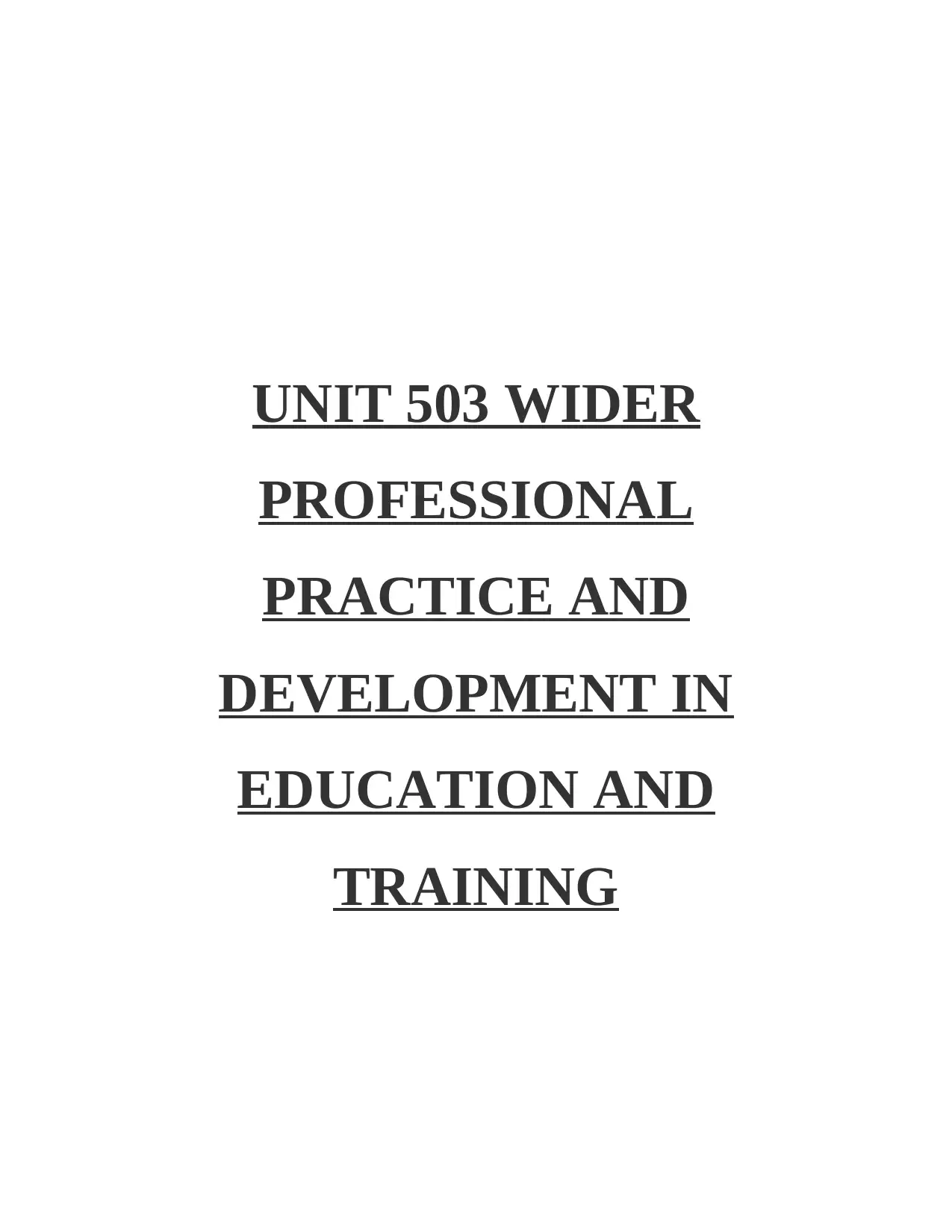
UNIT 503 WIDER
PROFESSIONAL
PRACTICE AND
DEVELOPMENT IN
EDUCATION AND
TRAINING
PROFESSIONAL
PRACTICE AND
DEVELOPMENT IN
EDUCATION AND
TRAINING
Paraphrase This Document
Need a fresh take? Get an instant paraphrase of this document with our AI Paraphraser
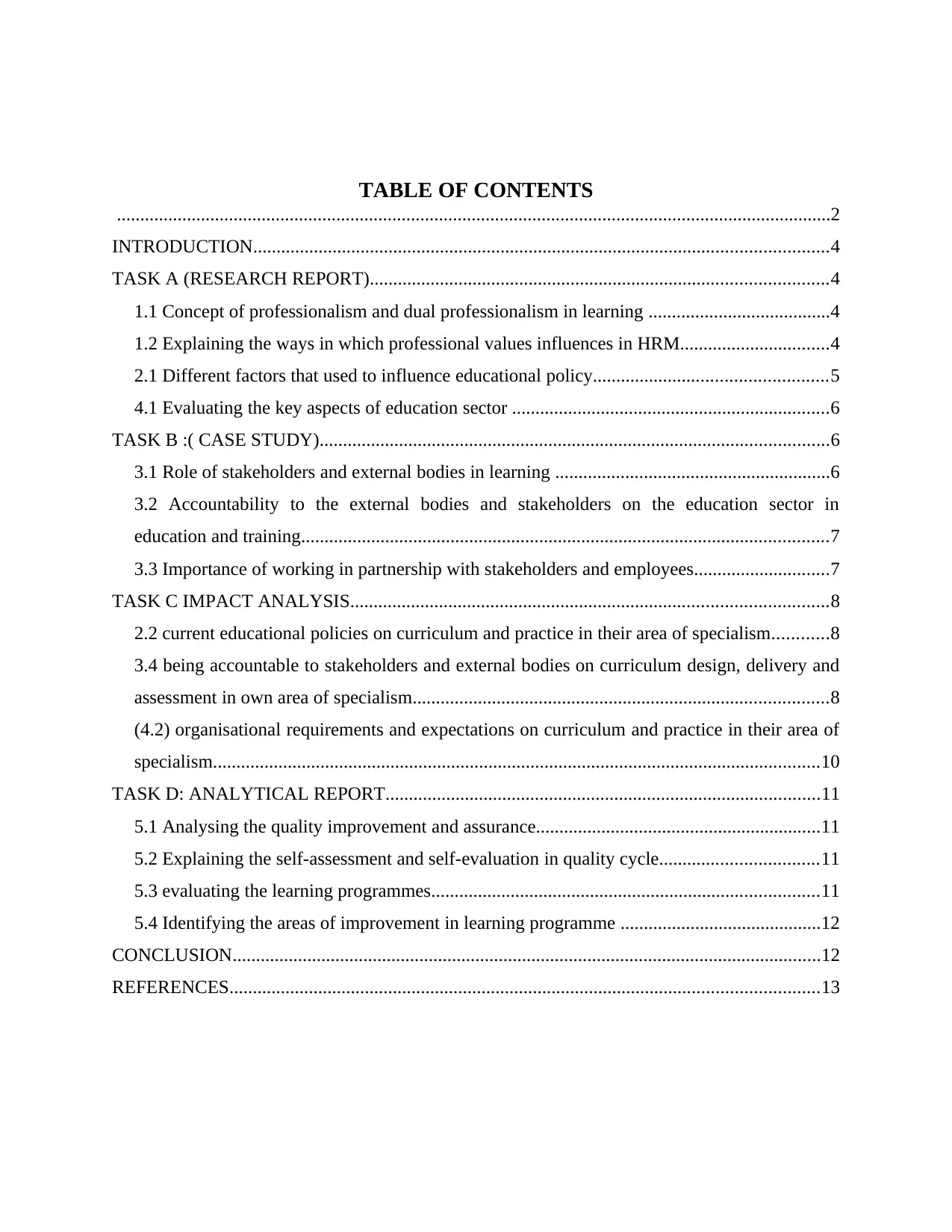
TABLE OF CONTENTS
.........................................................................................................................................................2
INTRODUCTION...........................................................................................................................4
TASK A (RESEARCH REPORT)..................................................................................................4
1.1 Concept of professionalism and dual professionalism in learning .......................................4
1.2 Explaining the ways in which professional values influences in HRM................................4
2.1 Different factors that used to influence educational policy..................................................5
4.1 Evaluating the key aspects of education sector ....................................................................6
TASK B :( CASE STUDY).............................................................................................................6
3.1 Role of stakeholders and external bodies in learning ...........................................................6
3.2 Accountability to the external bodies and stakeholders on the education sector in
education and training.................................................................................................................7
3.3 Importance of working in partnership with stakeholders and employees.............................7
TASK C IMPACT ANALYSIS......................................................................................................8
2.2 current educational policies on curriculum and practice in their area of specialism............8
3.4 being accountable to stakeholders and external bodies on curriculum design, delivery and
assessment in own area of specialism.........................................................................................8
(4.2) organisational requirements and expectations on curriculum and practice in their area of
specialism..................................................................................................................................10
TASK D: ANALYTICAL REPORT.............................................................................................11
5.1 Analysing the quality improvement and assurance.............................................................11
5.2 Explaining the self-assessment and self-evaluation in quality cycle..................................11
5.3 evaluating the learning programmes...................................................................................11
5.4 Identifying the areas of improvement in learning programme ...........................................12
CONCLUSION..............................................................................................................................12
REFERENCES..............................................................................................................................13
.........................................................................................................................................................2
INTRODUCTION...........................................................................................................................4
TASK A (RESEARCH REPORT)..................................................................................................4
1.1 Concept of professionalism and dual professionalism in learning .......................................4
1.2 Explaining the ways in which professional values influences in HRM................................4
2.1 Different factors that used to influence educational policy..................................................5
4.1 Evaluating the key aspects of education sector ....................................................................6
TASK B :( CASE STUDY).............................................................................................................6
3.1 Role of stakeholders and external bodies in learning ...........................................................6
3.2 Accountability to the external bodies and stakeholders on the education sector in
education and training.................................................................................................................7
3.3 Importance of working in partnership with stakeholders and employees.............................7
TASK C IMPACT ANALYSIS......................................................................................................8
2.2 current educational policies on curriculum and practice in their area of specialism............8
3.4 being accountable to stakeholders and external bodies on curriculum design, delivery and
assessment in own area of specialism.........................................................................................8
(4.2) organisational requirements and expectations on curriculum and practice in their area of
specialism..................................................................................................................................10
TASK D: ANALYTICAL REPORT.............................................................................................11
5.1 Analysing the quality improvement and assurance.............................................................11
5.2 Explaining the self-assessment and self-evaluation in quality cycle..................................11
5.3 evaluating the learning programmes...................................................................................11
5.4 Identifying the areas of improvement in learning programme ...........................................12
CONCLUSION..............................................................................................................................12
REFERENCES..............................................................................................................................13
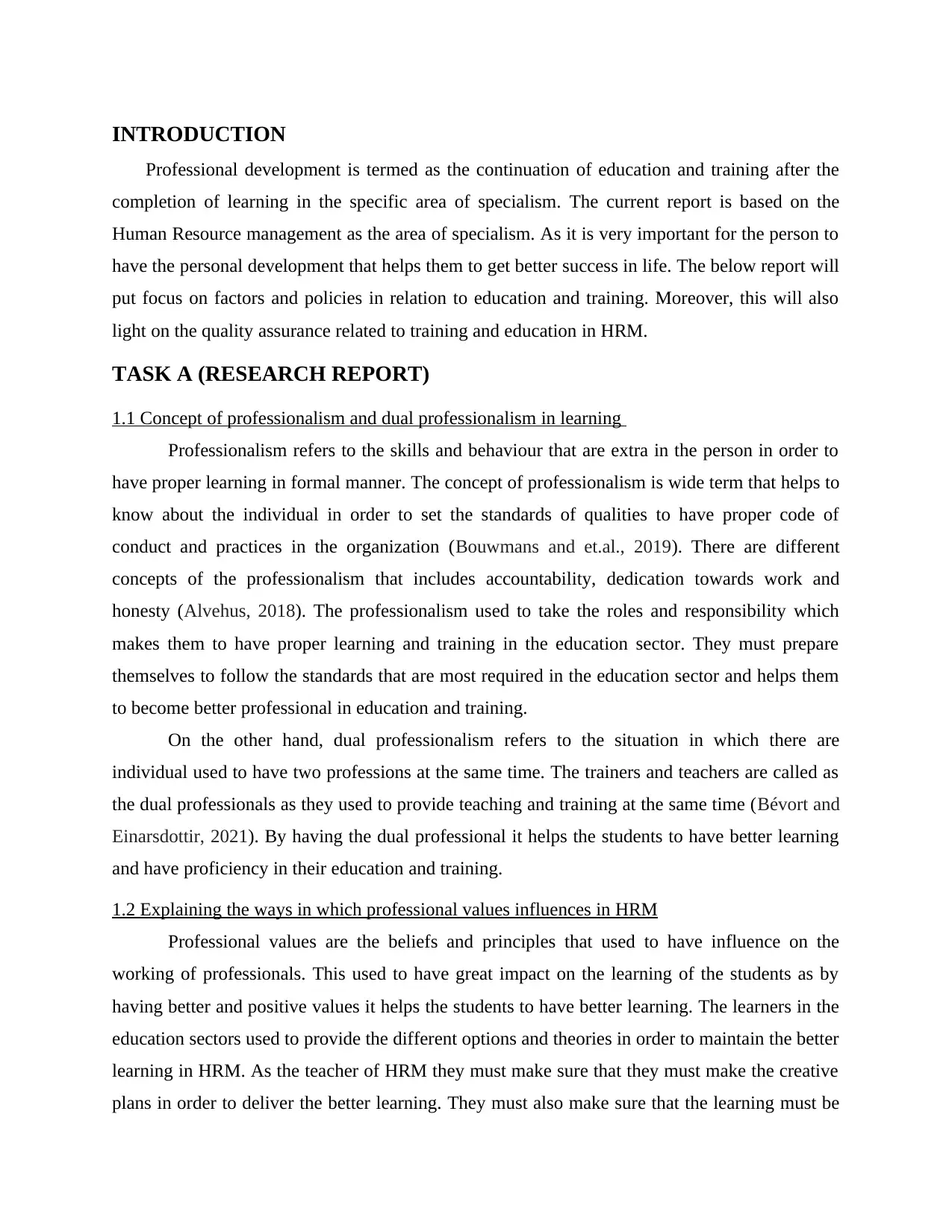
INTRODUCTION
Professional development is termed as the continuation of education and training after the
completion of learning in the specific area of specialism. The current report is based on the
Human Resource management as the area of specialism. As it is very important for the person to
have the personal development that helps them to get better success in life. The below report will
put focus on factors and policies in relation to education and training. Moreover, this will also
light on the quality assurance related to training and education in HRM.
TASK A (RESEARCH REPORT)
1.1 Concept of professionalism and dual professionalism in learning
Professionalism refers to the skills and behaviour that are extra in the person in order to
have proper learning in formal manner. The concept of professionalism is wide term that helps to
know about the individual in order to set the standards of qualities to have proper code of
conduct and practices in the organization (Bouwmans and et.al., 2019). There are different
concepts of the professionalism that includes accountability, dedication towards work and
honesty (Alvehus, 2018). The professionalism used to take the roles and responsibility which
makes them to have proper learning and training in the education sector. They must prepare
themselves to follow the standards that are most required in the education sector and helps them
to become better professional in education and training.
On the other hand, dual professionalism refers to the situation in which there are
individual used to have two professions at the same time. The trainers and teachers are called as
the dual professionals as they used to provide teaching and training at the same time (Bévort and
Einarsdottir, 2021). By having the dual professional it helps the students to have better learning
and have proficiency in their education and training.
1.2 Explaining the ways in which professional values influences in HRM
Professional values are the beliefs and principles that used to have influence on the
working of professionals. This used to have great impact on the learning of the students as by
having better and positive values it helps the students to have better learning. The learners in the
education sectors used to provide the different options and theories in order to maintain the better
learning in HRM. As the teacher of HRM they must make sure that they must make the creative
plans in order to deliver the better learning. They must also make sure that the learning must be
Professional development is termed as the continuation of education and training after the
completion of learning in the specific area of specialism. The current report is based on the
Human Resource management as the area of specialism. As it is very important for the person to
have the personal development that helps them to get better success in life. The below report will
put focus on factors and policies in relation to education and training. Moreover, this will also
light on the quality assurance related to training and education in HRM.
TASK A (RESEARCH REPORT)
1.1 Concept of professionalism and dual professionalism in learning
Professionalism refers to the skills and behaviour that are extra in the person in order to
have proper learning in formal manner. The concept of professionalism is wide term that helps to
know about the individual in order to set the standards of qualities to have proper code of
conduct and practices in the organization (Bouwmans and et.al., 2019). There are different
concepts of the professionalism that includes accountability, dedication towards work and
honesty (Alvehus, 2018). The professionalism used to take the roles and responsibility which
makes them to have proper learning and training in the education sector. They must prepare
themselves to follow the standards that are most required in the education sector and helps them
to become better professional in education and training.
On the other hand, dual professionalism refers to the situation in which there are
individual used to have two professions at the same time. The trainers and teachers are called as
the dual professionals as they used to provide teaching and training at the same time (Bévort and
Einarsdottir, 2021). By having the dual professional it helps the students to have better learning
and have proficiency in their education and training.
1.2 Explaining the ways in which professional values influences in HRM
Professional values are the beliefs and principles that used to have influence on the
working of professionals. This used to have great impact on the learning of the students as by
having better and positive values it helps the students to have better learning. The learners in the
education sectors used to provide the different options and theories in order to maintain the better
learning in HRM. As the teacher of HRM they must make sure that they must make the creative
plans in order to deliver the better learning. They must also make sure that the learning must be
⊘ This is a preview!⊘
Do you want full access?
Subscribe today to unlock all pages.

Trusted by 1+ million students worldwide
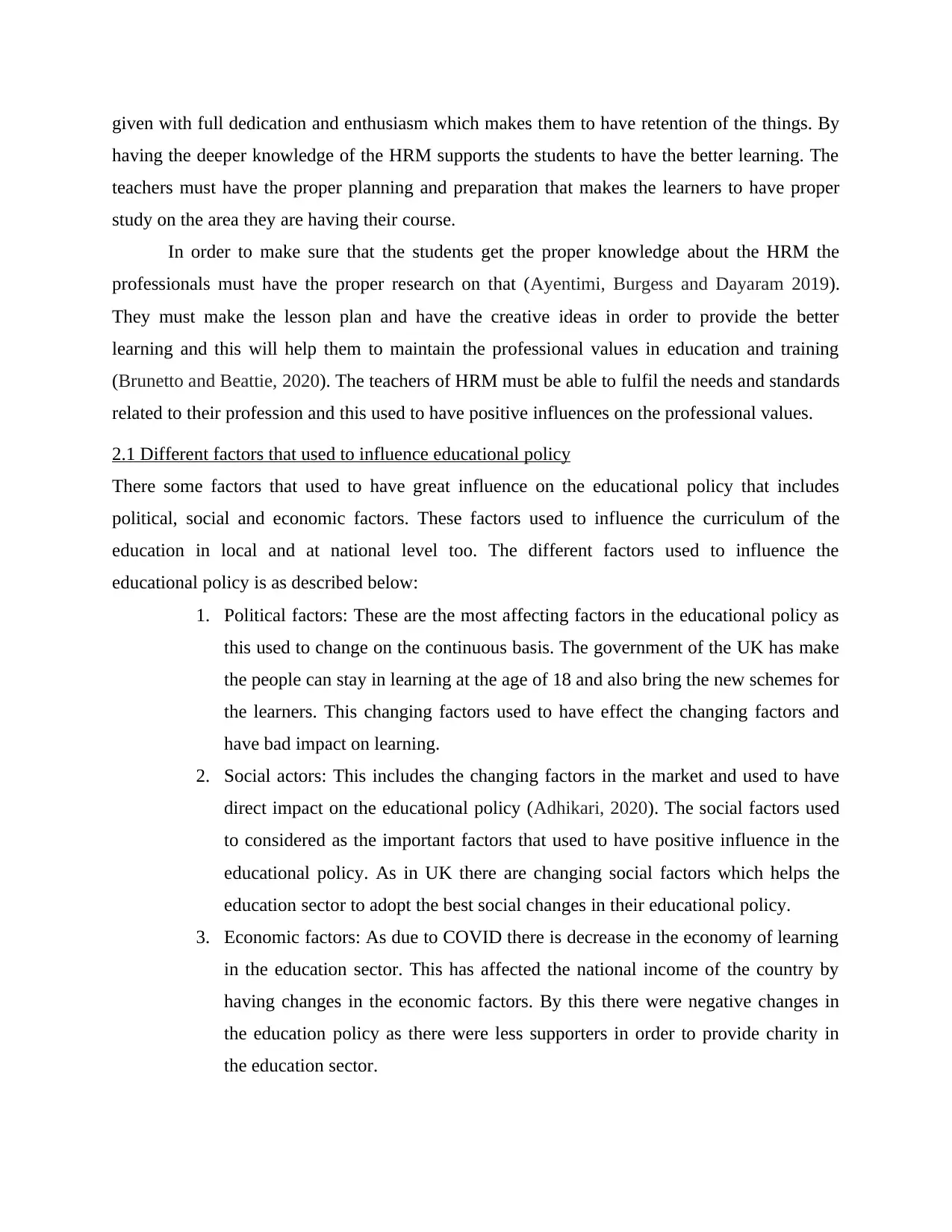
given with full dedication and enthusiasm which makes them to have retention of the things. By
having the deeper knowledge of the HRM supports the students to have the better learning. The
teachers must have the proper planning and preparation that makes the learners to have proper
study on the area they are having their course.
In order to make sure that the students get the proper knowledge about the HRM the
professionals must have the proper research on that (Ayentimi, Burgess and Dayaram 2019).
They must make the lesson plan and have the creative ideas in order to provide the better
learning and this will help them to maintain the professional values in education and training
(Brunetto and Beattie, 2020). The teachers of HRM must be able to fulfil the needs and standards
related to their profession and this used to have positive influences on the professional values.
2.1 Different factors that used to influence educational policy
There some factors that used to have great influence on the educational policy that includes
political, social and economic factors. These factors used to influence the curriculum of the
education in local and at national level too. The different factors used to influence the
educational policy is as described below:
1. Political factors: These are the most affecting factors in the educational policy as
this used to change on the continuous basis. The government of the UK has make
the people can stay in learning at the age of 18 and also bring the new schemes for
the learners. This changing factors used to have effect the changing factors and
have bad impact on learning.
2. Social actors: This includes the changing factors in the market and used to have
direct impact on the educational policy (Adhikari, 2020). The social factors used
to considered as the important factors that used to have positive influence in the
educational policy. As in UK there are changing social factors which helps the
education sector to adopt the best social changes in their educational policy.
3. Economic factors: As due to COVID there is decrease in the economy of learning
in the education sector. This has affected the national income of the country by
having changes in the economic factors. By this there were negative changes in
the education policy as there were less supporters in order to provide charity in
the education sector.
having the deeper knowledge of the HRM supports the students to have the better learning. The
teachers must have the proper planning and preparation that makes the learners to have proper
study on the area they are having their course.
In order to make sure that the students get the proper knowledge about the HRM the
professionals must have the proper research on that (Ayentimi, Burgess and Dayaram 2019).
They must make the lesson plan and have the creative ideas in order to provide the better
learning and this will help them to maintain the professional values in education and training
(Brunetto and Beattie, 2020). The teachers of HRM must be able to fulfil the needs and standards
related to their profession and this used to have positive influences on the professional values.
2.1 Different factors that used to influence educational policy
There some factors that used to have great influence on the educational policy that includes
political, social and economic factors. These factors used to influence the curriculum of the
education in local and at national level too. The different factors used to influence the
educational policy is as described below:
1. Political factors: These are the most affecting factors in the educational policy as
this used to change on the continuous basis. The government of the UK has make
the people can stay in learning at the age of 18 and also bring the new schemes for
the learners. This changing factors used to have effect the changing factors and
have bad impact on learning.
2. Social actors: This includes the changing factors in the market and used to have
direct impact on the educational policy (Adhikari, 2020). The social factors used
to considered as the important factors that used to have positive influence in the
educational policy. As in UK there are changing social factors which helps the
education sector to adopt the best social changes in their educational policy.
3. Economic factors: As due to COVID there is decrease in the economy of learning
in the education sector. This has affected the national income of the country by
having changes in the economic factors. By this there were negative changes in
the education policy as there were less supporters in order to provide charity in
the education sector.
Paraphrase This Document
Need a fresh take? Get an instant paraphrase of this document with our AI Paraphraser
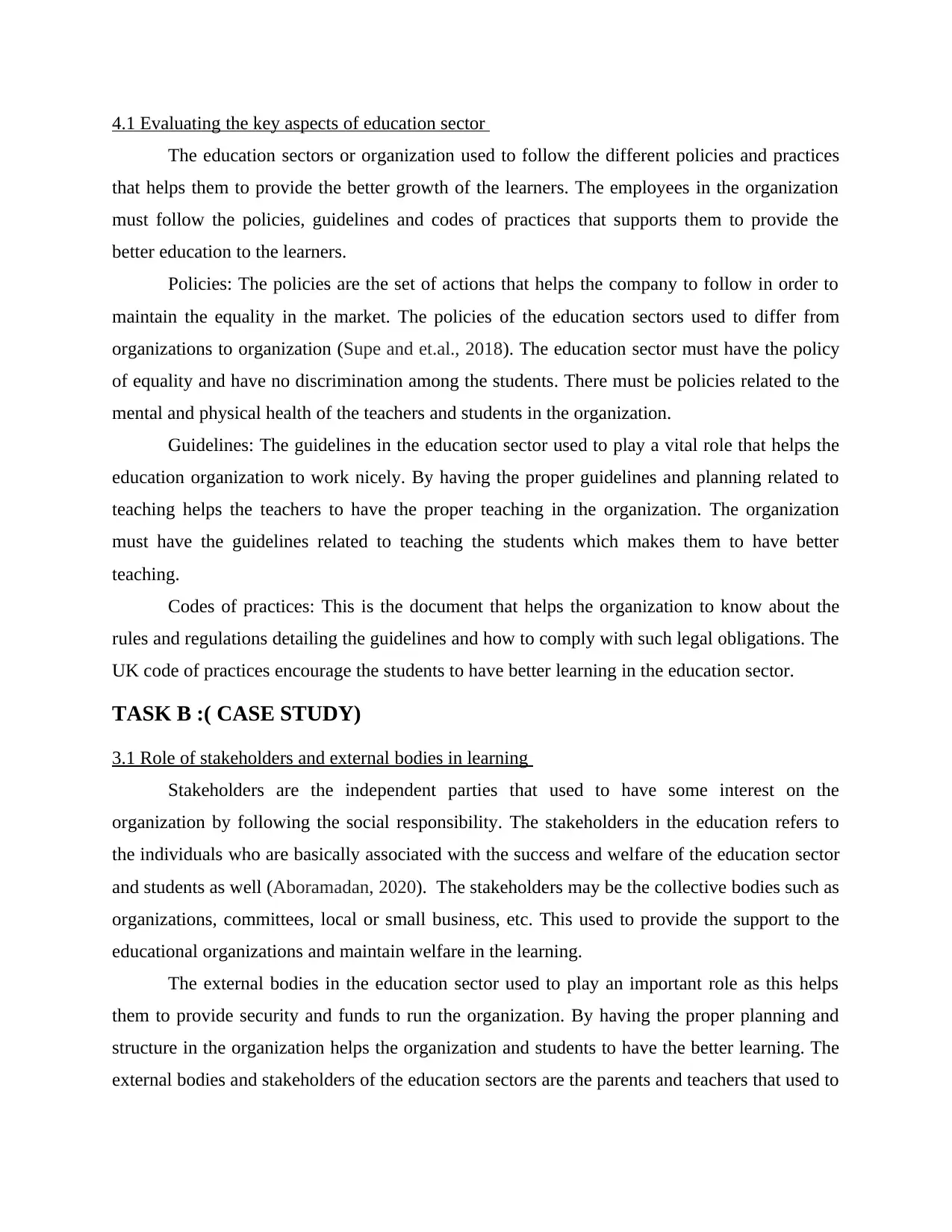
4.1 Evaluating the key aspects of education sector
The education sectors or organization used to follow the different policies and practices
that helps them to provide the better growth of the learners. The employees in the organization
must follow the policies, guidelines and codes of practices that supports them to provide the
better education to the learners.
Policies: The policies are the set of actions that helps the company to follow in order to
maintain the equality in the market. The policies of the education sectors used to differ from
organizations to organization (Supe and et.al., 2018). The education sector must have the policy
of equality and have no discrimination among the students. There must be policies related to the
mental and physical health of the teachers and students in the organization.
Guidelines: The guidelines in the education sector used to play a vital role that helps the
education organization to work nicely. By having the proper guidelines and planning related to
teaching helps the teachers to have the proper teaching in the organization. The organization
must have the guidelines related to teaching the students which makes them to have better
teaching.
Codes of practices: This is the document that helps the organization to know about the
rules and regulations detailing the guidelines and how to comply with such legal obligations. The
UK code of practices encourage the students to have better learning in the education sector.
TASK B :( CASE STUDY)
3.1 Role of stakeholders and external bodies in learning
Stakeholders are the independent parties that used to have some interest on the
organization by following the social responsibility. The stakeholders in the education refers to
the individuals who are basically associated with the success and welfare of the education sector
and students as well (Aboramadan, 2020). The stakeholders may be the collective bodies such as
organizations, committees, local or small business, etc. This used to provide the support to the
educational organizations and maintain welfare in the learning.
The external bodies in the education sector used to play an important role as this helps
them to provide security and funds to run the organization. By having the proper planning and
structure in the organization helps the organization and students to have the better learning. The
external bodies and stakeholders of the education sectors are the parents and teachers that used to
The education sectors or organization used to follow the different policies and practices
that helps them to provide the better growth of the learners. The employees in the organization
must follow the policies, guidelines and codes of practices that supports them to provide the
better education to the learners.
Policies: The policies are the set of actions that helps the company to follow in order to
maintain the equality in the market. The policies of the education sectors used to differ from
organizations to organization (Supe and et.al., 2018). The education sector must have the policy
of equality and have no discrimination among the students. There must be policies related to the
mental and physical health of the teachers and students in the organization.
Guidelines: The guidelines in the education sector used to play a vital role that helps the
education organization to work nicely. By having the proper guidelines and planning related to
teaching helps the teachers to have the proper teaching in the organization. The organization
must have the guidelines related to teaching the students which makes them to have better
teaching.
Codes of practices: This is the document that helps the organization to know about the
rules and regulations detailing the guidelines and how to comply with such legal obligations. The
UK code of practices encourage the students to have better learning in the education sector.
TASK B :( CASE STUDY)
3.1 Role of stakeholders and external bodies in learning
Stakeholders are the independent parties that used to have some interest on the
organization by following the social responsibility. The stakeholders in the education refers to
the individuals who are basically associated with the success and welfare of the education sector
and students as well (Aboramadan, 2020). The stakeholders may be the collective bodies such as
organizations, committees, local or small business, etc. This used to provide the support to the
educational organizations and maintain welfare in the learning.
The external bodies in the education sector used to play an important role as this helps
them to provide security and funds to run the organization. By having the proper planning and
structure in the organization helps the organization and students to have the better learning. The
external bodies and stakeholders of the education sectors are the parents and teachers that used to
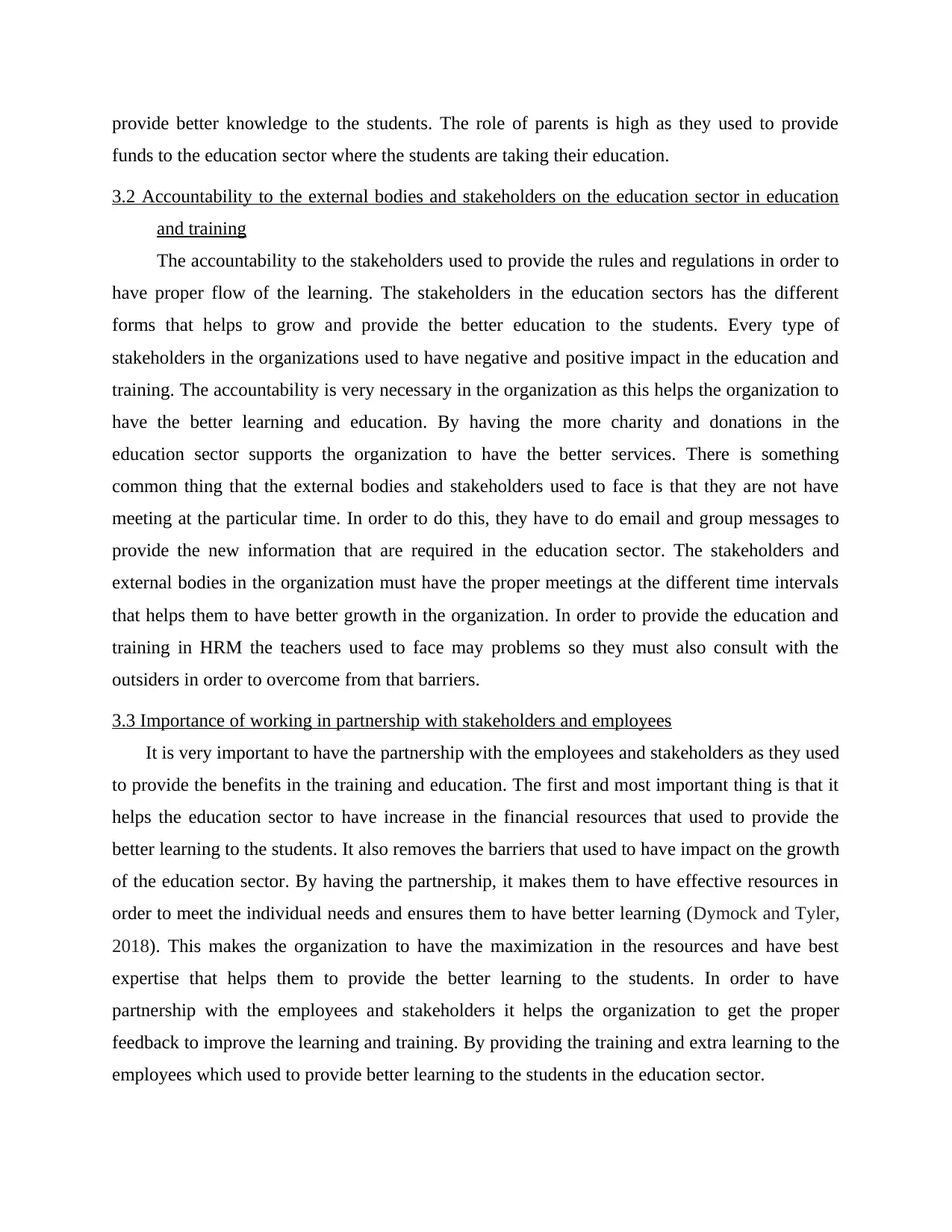
provide better knowledge to the students. The role of parents is high as they used to provide
funds to the education sector where the students are taking their education.
3.2 Accountability to the external bodies and stakeholders on the education sector in education
and training
The accountability to the stakeholders used to provide the rules and regulations in order to
have proper flow of the learning. The stakeholders in the education sectors has the different
forms that helps to grow and provide the better education to the students. Every type of
stakeholders in the organizations used to have negative and positive impact in the education and
training. The accountability is very necessary in the organization as this helps the organization to
have the better learning and education. By having the more charity and donations in the
education sector supports the organization to have the better services. There is something
common thing that the external bodies and stakeholders used to face is that they are not have
meeting at the particular time. In order to do this, they have to do email and group messages to
provide the new information that are required in the education sector. The stakeholders and
external bodies in the organization must have the proper meetings at the different time intervals
that helps them to have better growth in the organization. In order to provide the education and
training in HRM the teachers used to face may problems so they must also consult with the
outsiders in order to overcome from that barriers.
3.3 Importance of working in partnership with stakeholders and employees
It is very important to have the partnership with the employees and stakeholders as they used
to provide the benefits in the training and education. The first and most important thing is that it
helps the education sector to have increase in the financial resources that used to provide the
better learning to the students. It also removes the barriers that used to have impact on the growth
of the education sector. By having the partnership, it makes them to have effective resources in
order to meet the individual needs and ensures them to have better learning (Dymock and Tyler,
2018). This makes the organization to have the maximization in the resources and have best
expertise that helps them to provide the better learning to the students. In order to have
partnership with the employees and stakeholders it helps the organization to get the proper
feedback to improve the learning and training. By providing the training and extra learning to the
employees which used to provide better learning to the students in the education sector.
funds to the education sector where the students are taking their education.
3.2 Accountability to the external bodies and stakeholders on the education sector in education
and training
The accountability to the stakeholders used to provide the rules and regulations in order to
have proper flow of the learning. The stakeholders in the education sectors has the different
forms that helps to grow and provide the better education to the students. Every type of
stakeholders in the organizations used to have negative and positive impact in the education and
training. The accountability is very necessary in the organization as this helps the organization to
have the better learning and education. By having the more charity and donations in the
education sector supports the organization to have the better services. There is something
common thing that the external bodies and stakeholders used to face is that they are not have
meeting at the particular time. In order to do this, they have to do email and group messages to
provide the new information that are required in the education sector. The stakeholders and
external bodies in the organization must have the proper meetings at the different time intervals
that helps them to have better growth in the organization. In order to provide the education and
training in HRM the teachers used to face may problems so they must also consult with the
outsiders in order to overcome from that barriers.
3.3 Importance of working in partnership with stakeholders and employees
It is very important to have the partnership with the employees and stakeholders as they used
to provide the benefits in the training and education. The first and most important thing is that it
helps the education sector to have increase in the financial resources that used to provide the
better learning to the students. It also removes the barriers that used to have impact on the growth
of the education sector. By having the partnership, it makes them to have effective resources in
order to meet the individual needs and ensures them to have better learning (Dymock and Tyler,
2018). This makes the organization to have the maximization in the resources and have best
expertise that helps them to provide the better learning to the students. In order to have
partnership with the employees and stakeholders it helps the organization to get the proper
feedback to improve the learning and training. By providing the training and extra learning to the
employees which used to provide better learning to the students in the education sector.
⊘ This is a preview!⊘
Do you want full access?
Subscribe today to unlock all pages.

Trusted by 1+ million students worldwide
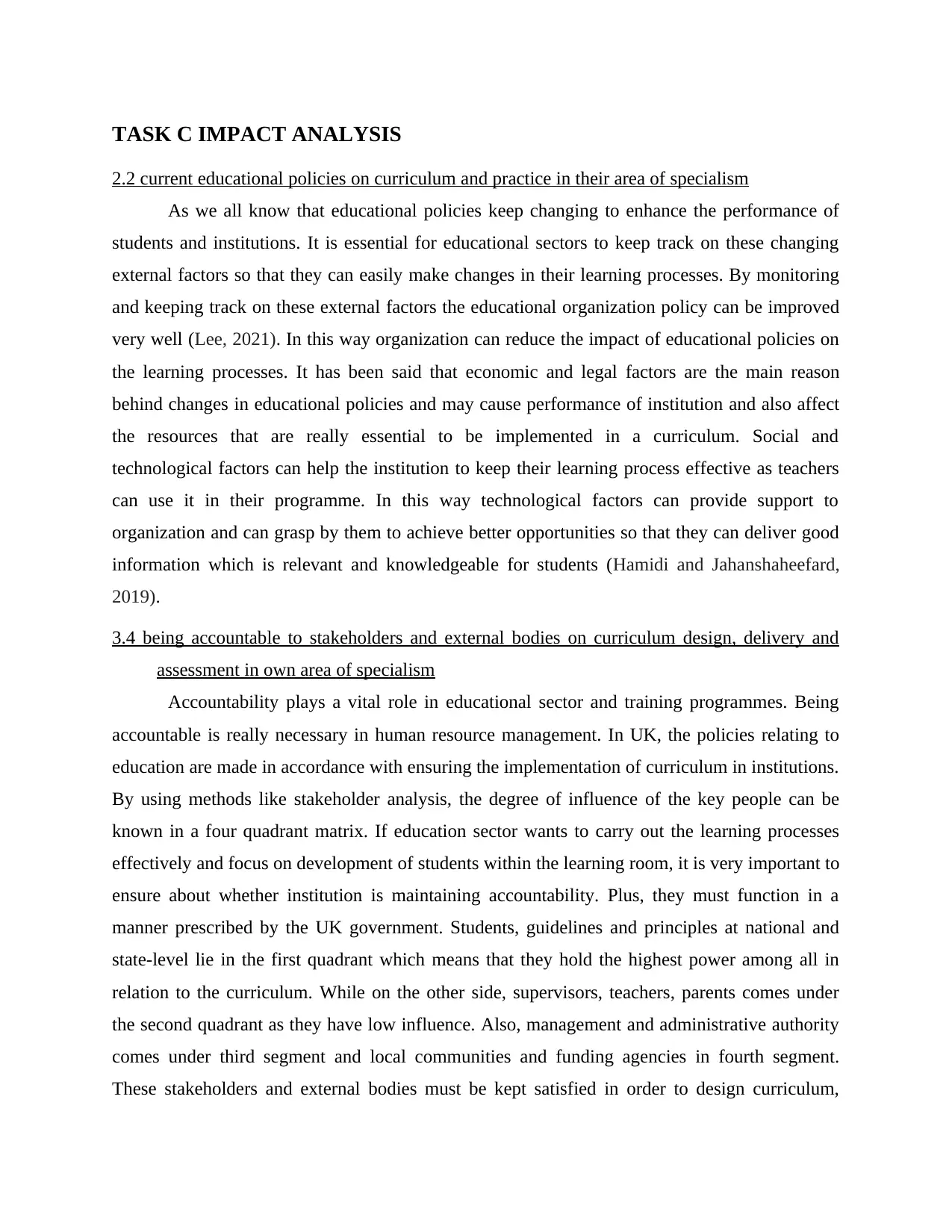
TASK C IMPACT ANALYSIS
2.2 current educational policies on curriculum and practice in their area of specialism
As we all know that educational policies keep changing to enhance the performance of
students and institutions. It is essential for educational sectors to keep track on these changing
external factors so that they can easily make changes in their learning processes. By monitoring
and keeping track on these external factors the educational organization policy can be improved
very well (Lee, 2021). In this way organization can reduce the impact of educational policies on
the learning processes. It has been said that economic and legal factors are the main reason
behind changes in educational policies and may cause performance of institution and also affect
the resources that are really essential to be implemented in a curriculum. Social and
technological factors can help the institution to keep their learning process effective as teachers
can use it in their programme. In this way technological factors can provide support to
organization and can grasp by them to achieve better opportunities so that they can deliver good
information which is relevant and knowledgeable for students (Hamidi and Jahanshaheefard,
2019).
3.4 being accountable to stakeholders and external bodies on curriculum design, delivery and
assessment in own area of specialism
Accountability plays a vital role in educational sector and training programmes. Being
accountable is really necessary in human resource management. In UK, the policies relating to
education are made in accordance with ensuring the implementation of curriculum in institutions.
By using methods like stakeholder analysis, the degree of influence of the key people can be
known in a four quadrant matrix. If education sector wants to carry out the learning processes
effectively and focus on development of students within the learning room, it is very important to
ensure about whether institution is maintaining accountability. Plus, they must function in a
manner prescribed by the UK government. Students, guidelines and principles at national and
state-level lie in the first quadrant which means that they hold the highest power among all in
relation to the curriculum. While on the other side, supervisors, teachers, parents comes under
the second quadrant as they have low influence. Also, management and administrative authority
comes under third segment and local communities and funding agencies in fourth segment.
These stakeholders and external bodies must be kept satisfied in order to design curriculum,
2.2 current educational policies on curriculum and practice in their area of specialism
As we all know that educational policies keep changing to enhance the performance of
students and institutions. It is essential for educational sectors to keep track on these changing
external factors so that they can easily make changes in their learning processes. By monitoring
and keeping track on these external factors the educational organization policy can be improved
very well (Lee, 2021). In this way organization can reduce the impact of educational policies on
the learning processes. It has been said that economic and legal factors are the main reason
behind changes in educational policies and may cause performance of institution and also affect
the resources that are really essential to be implemented in a curriculum. Social and
technological factors can help the institution to keep their learning process effective as teachers
can use it in their programme. In this way technological factors can provide support to
organization and can grasp by them to achieve better opportunities so that they can deliver good
information which is relevant and knowledgeable for students (Hamidi and Jahanshaheefard,
2019).
3.4 being accountable to stakeholders and external bodies on curriculum design, delivery and
assessment in own area of specialism
Accountability plays a vital role in educational sector and training programmes. Being
accountable is really necessary in human resource management. In UK, the policies relating to
education are made in accordance with ensuring the implementation of curriculum in institutions.
By using methods like stakeholder analysis, the degree of influence of the key people can be
known in a four quadrant matrix. If education sector wants to carry out the learning processes
effectively and focus on development of students within the learning room, it is very important to
ensure about whether institution is maintaining accountability. Plus, they must function in a
manner prescribed by the UK government. Students, guidelines and principles at national and
state-level lie in the first quadrant which means that they hold the highest power among all in
relation to the curriculum. While on the other side, supervisors, teachers, parents comes under
the second quadrant as they have low influence. Also, management and administrative authority
comes under third segment and local communities and funding agencies in fourth segment.
These stakeholders and external bodies must be kept satisfied in order to design curriculum,
Paraphrase This Document
Need a fresh take? Get an instant paraphrase of this document with our AI Paraphraser
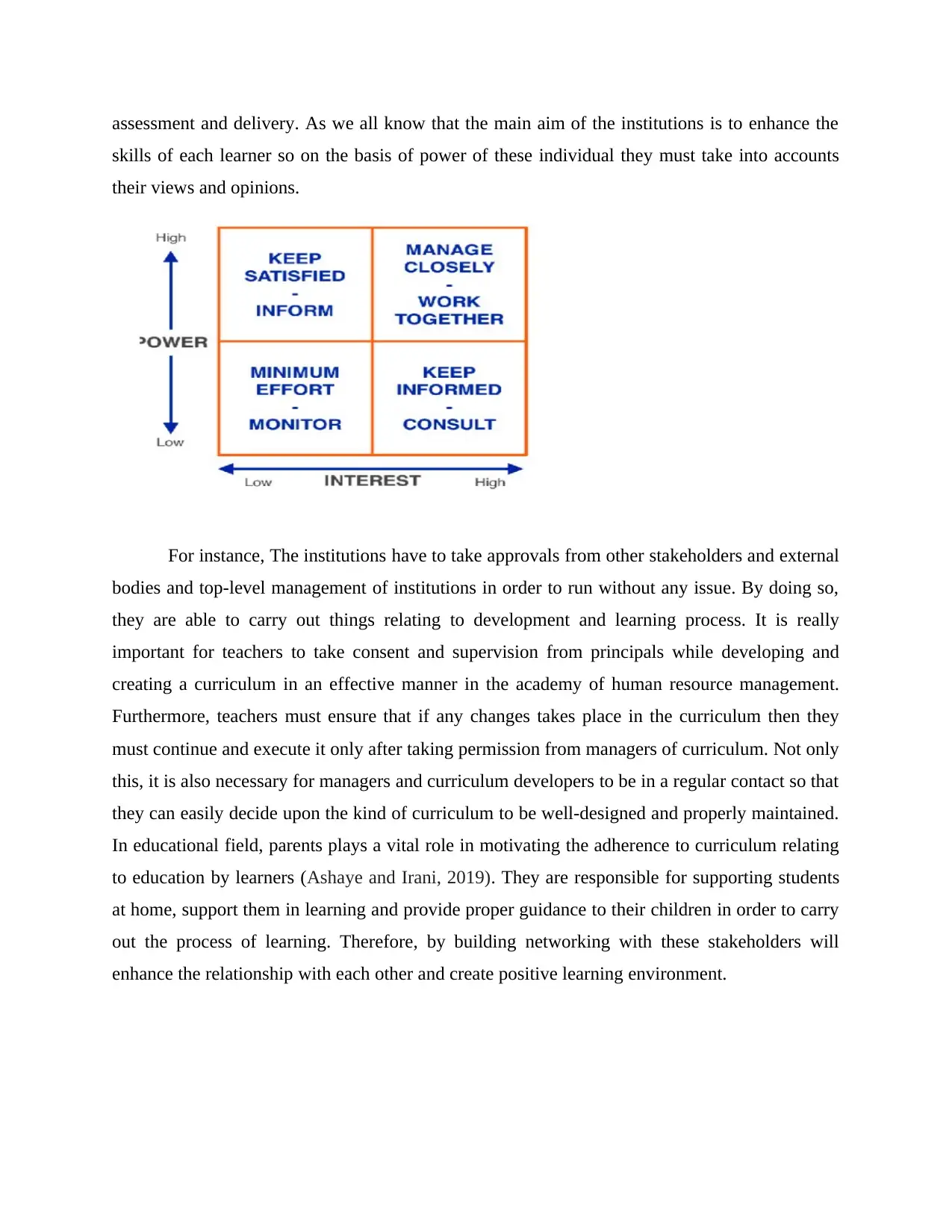
assessment and delivery. As we all know that the main aim of the institutions is to enhance the
skills of each learner so on the basis of power of these individual they must take into accounts
their views and opinions.
For instance, The institutions have to take approvals from other stakeholders and external
bodies and top-level management of institutions in order to run without any issue. By doing so,
they are able to carry out things relating to development and learning process. It is really
important for teachers to take consent and supervision from principals while developing and
creating a curriculum in an effective manner in the academy of human resource management.
Furthermore, teachers must ensure that if any changes takes place in the curriculum then they
must continue and execute it only after taking permission from managers of curriculum. Not only
this, it is also necessary for managers and curriculum developers to be in a regular contact so that
they can easily decide upon the kind of curriculum to be well-designed and properly maintained.
In educational field, parents plays a vital role in motivating the adherence to curriculum relating
to education by learners (Ashaye and Irani, 2019). They are responsible for supporting students
at home, support them in learning and provide proper guidance to their children in order to carry
out the process of learning. Therefore, by building networking with these stakeholders will
enhance the relationship with each other and create positive learning environment.
skills of each learner so on the basis of power of these individual they must take into accounts
their views and opinions.
For instance, The institutions have to take approvals from other stakeholders and external
bodies and top-level management of institutions in order to run without any issue. By doing so,
they are able to carry out things relating to development and learning process. It is really
important for teachers to take consent and supervision from principals while developing and
creating a curriculum in an effective manner in the academy of human resource management.
Furthermore, teachers must ensure that if any changes takes place in the curriculum then they
must continue and execute it only after taking permission from managers of curriculum. Not only
this, it is also necessary for managers and curriculum developers to be in a regular contact so that
they can easily decide upon the kind of curriculum to be well-designed and properly maintained.
In educational field, parents plays a vital role in motivating the adherence to curriculum relating
to education by learners (Ashaye and Irani, 2019). They are responsible for supporting students
at home, support them in learning and provide proper guidance to their children in order to carry
out the process of learning. Therefore, by building networking with these stakeholders will
enhance the relationship with each other and create positive learning environment.
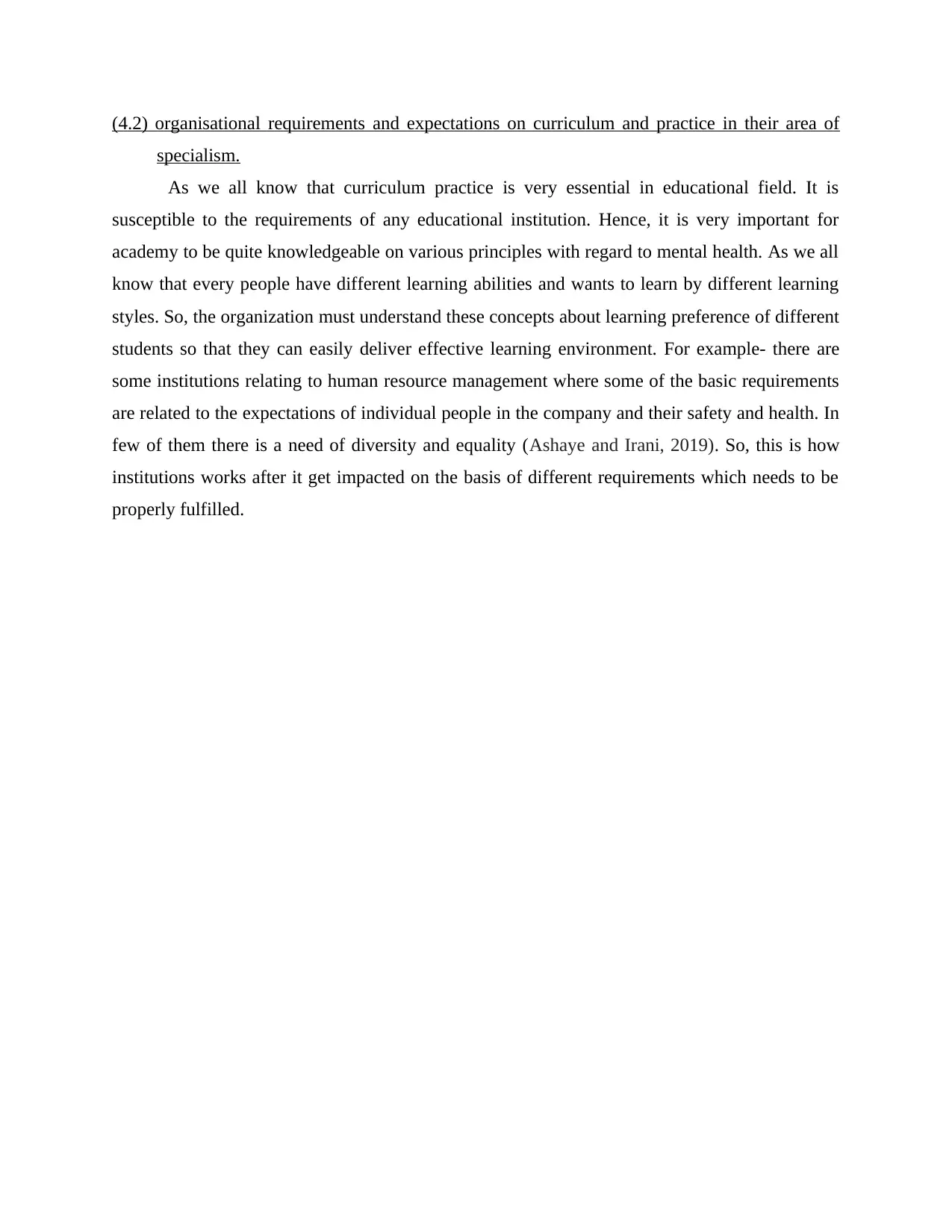
(4.2) organisational requirements and expectations on curriculum and practice in their area of
specialism.
As we all know that curriculum practice is very essential in educational field. It is
susceptible to the requirements of any educational institution. Hence, it is very important for
academy to be quite knowledgeable on various principles with regard to mental health. As we all
know that every people have different learning abilities and wants to learn by different learning
styles. So, the organization must understand these concepts about learning preference of different
students so that they can easily deliver effective learning environment. For example- there are
some institutions relating to human resource management where some of the basic requirements
are related to the expectations of individual people in the company and their safety and health. In
few of them there is a need of diversity and equality (Ashaye and Irani, 2019). So, this is how
institutions works after it get impacted on the basis of different requirements which needs to be
properly fulfilled.
specialism.
As we all know that curriculum practice is very essential in educational field. It is
susceptible to the requirements of any educational institution. Hence, it is very important for
academy to be quite knowledgeable on various principles with regard to mental health. As we all
know that every people have different learning abilities and wants to learn by different learning
styles. So, the organization must understand these concepts about learning preference of different
students so that they can easily deliver effective learning environment. For example- there are
some institutions relating to human resource management where some of the basic requirements
are related to the expectations of individual people in the company and their safety and health. In
few of them there is a need of diversity and equality (Ashaye and Irani, 2019). So, this is how
institutions works after it get impacted on the basis of different requirements which needs to be
properly fulfilled.
⊘ This is a preview!⊘
Do you want full access?
Subscribe today to unlock all pages.

Trusted by 1+ million students worldwide
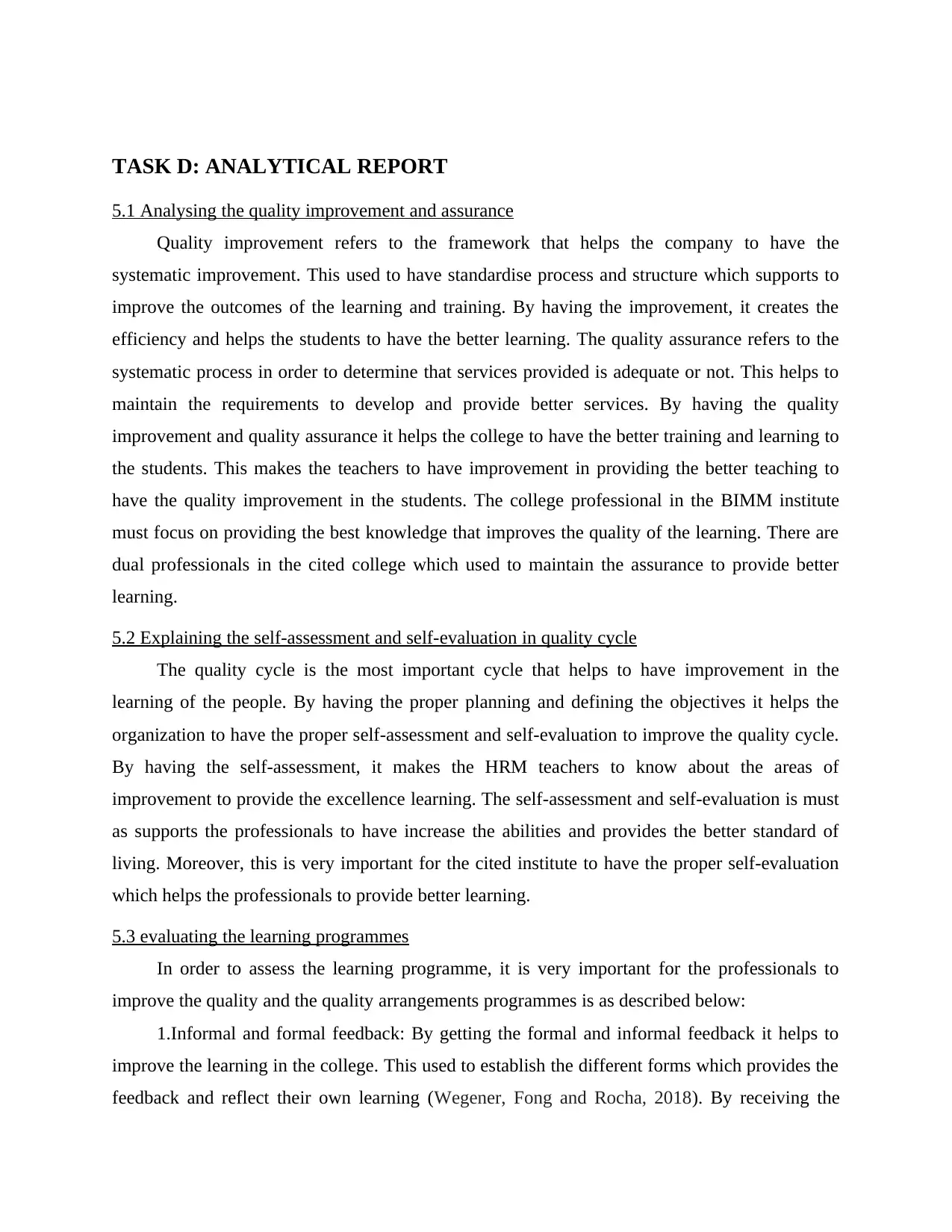
TASK D: ANALYTICAL REPORT
5.1 Analysing the quality improvement and assurance
Quality improvement refers to the framework that helps the company to have the
systematic improvement. This used to have standardise process and structure which supports to
improve the outcomes of the learning and training. By having the improvement, it creates the
efficiency and helps the students to have the better learning. The quality assurance refers to the
systematic process in order to determine that services provided is adequate or not. This helps to
maintain the requirements to develop and provide better services. By having the quality
improvement and quality assurance it helps the college to have the better training and learning to
the students. This makes the teachers to have improvement in providing the better teaching to
have the quality improvement in the students. The college professional in the BIMM institute
must focus on providing the best knowledge that improves the quality of the learning. There are
dual professionals in the cited college which used to maintain the assurance to provide better
learning.
5.2 Explaining the self-assessment and self-evaluation in quality cycle
The quality cycle is the most important cycle that helps to have improvement in the
learning of the people. By having the proper planning and defining the objectives it helps the
organization to have the proper self-assessment and self-evaluation to improve the quality cycle.
By having the self-assessment, it makes the HRM teachers to know about the areas of
improvement to provide the excellence learning. The self-assessment and self-evaluation is must
as supports the professionals to have increase the abilities and provides the better standard of
living. Moreover, this is very important for the cited institute to have the proper self-evaluation
which helps the professionals to provide better learning.
5.3 evaluating the learning programmes
In order to assess the learning programme, it is very important for the professionals to
improve the quality and the quality arrangements programmes is as described below:
1.Informal and formal feedback: By getting the formal and informal feedback it helps to
improve the learning in the college. This used to establish the different forms which provides the
feedback and reflect their own learning (Wegener, Fong and Rocha, 2018). By receiving the
5.1 Analysing the quality improvement and assurance
Quality improvement refers to the framework that helps the company to have the
systematic improvement. This used to have standardise process and structure which supports to
improve the outcomes of the learning and training. By having the improvement, it creates the
efficiency and helps the students to have the better learning. The quality assurance refers to the
systematic process in order to determine that services provided is adequate or not. This helps to
maintain the requirements to develop and provide better services. By having the quality
improvement and quality assurance it helps the college to have the better training and learning to
the students. This makes the teachers to have improvement in providing the better teaching to
have the quality improvement in the students. The college professional in the BIMM institute
must focus on providing the best knowledge that improves the quality of the learning. There are
dual professionals in the cited college which used to maintain the assurance to provide better
learning.
5.2 Explaining the self-assessment and self-evaluation in quality cycle
The quality cycle is the most important cycle that helps to have improvement in the
learning of the people. By having the proper planning and defining the objectives it helps the
organization to have the proper self-assessment and self-evaluation to improve the quality cycle.
By having the self-assessment, it makes the HRM teachers to know about the areas of
improvement to provide the excellence learning. The self-assessment and self-evaluation is must
as supports the professionals to have increase the abilities and provides the better standard of
living. Moreover, this is very important for the cited institute to have the proper self-evaluation
which helps the professionals to provide better learning.
5.3 evaluating the learning programmes
In order to assess the learning programme, it is very important for the professionals to
improve the quality and the quality arrangements programmes is as described below:
1.Informal and formal feedback: By getting the formal and informal feedback it helps to
improve the learning in the college. This used to establish the different forms which provides the
feedback and reflect their own learning (Wegener, Fong and Rocha, 2018). By receiving the
Paraphrase This Document
Need a fresh take? Get an instant paraphrase of this document with our AI Paraphraser
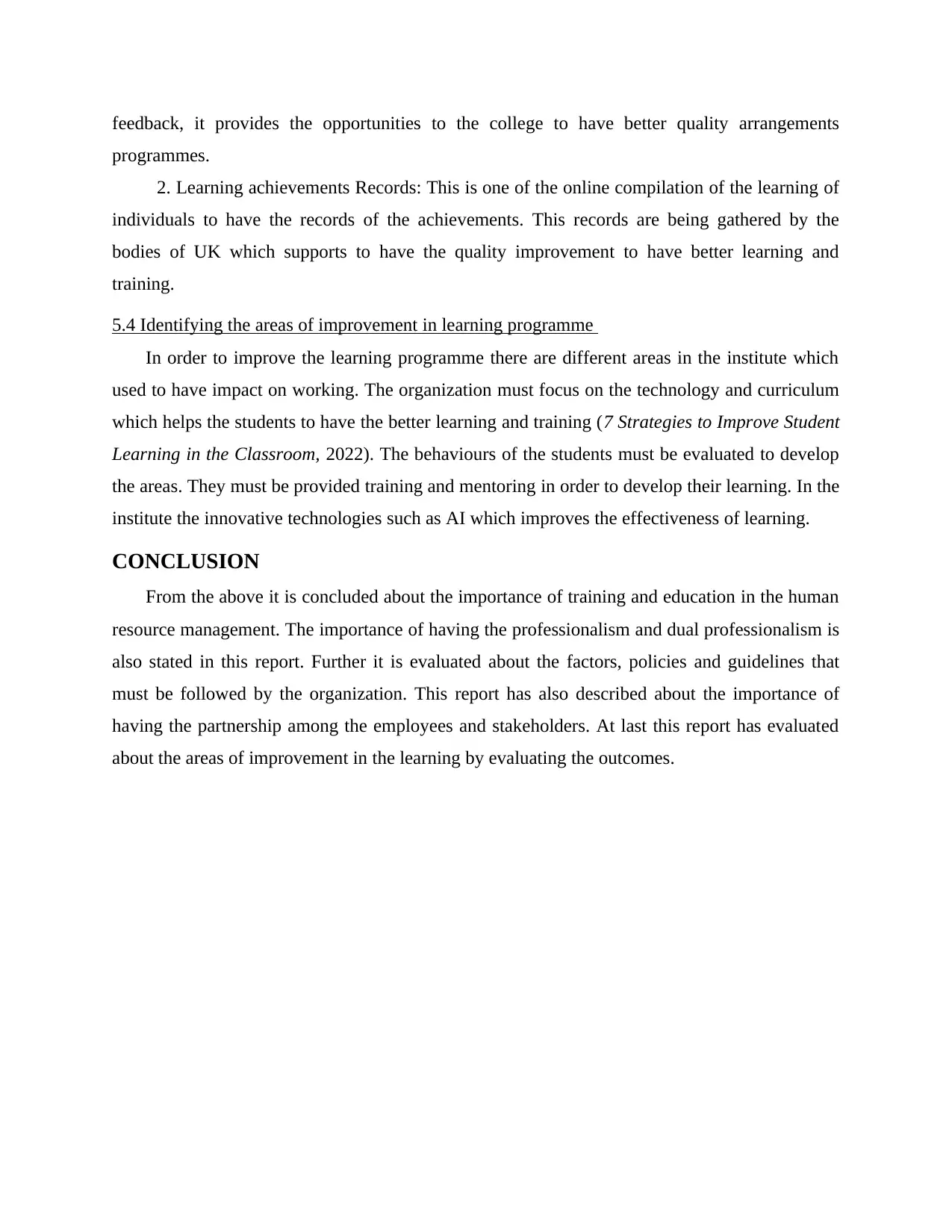
feedback, it provides the opportunities to the college to have better quality arrangements
programmes.
2. Learning achievements Records: This is one of the online compilation of the learning of
individuals to have the records of the achievements. This records are being gathered by the
bodies of UK which supports to have the quality improvement to have better learning and
training.
5.4 Identifying the areas of improvement in learning programme
In order to improve the learning programme there are different areas in the institute which
used to have impact on working. The organization must focus on the technology and curriculum
which helps the students to have the better learning and training (7 Strategies to Improve Student
Learning in the Classroom, 2022). The behaviours of the students must be evaluated to develop
the areas. They must be provided training and mentoring in order to develop their learning. In the
institute the innovative technologies such as AI which improves the effectiveness of learning.
CONCLUSION
From the above it is concluded about the importance of training and education in the human
resource management. The importance of having the professionalism and dual professionalism is
also stated in this report. Further it is evaluated about the factors, policies and guidelines that
must be followed by the organization. This report has also described about the importance of
having the partnership among the employees and stakeholders. At last this report has evaluated
about the areas of improvement in the learning by evaluating the outcomes.
programmes.
2. Learning achievements Records: This is one of the online compilation of the learning of
individuals to have the records of the achievements. This records are being gathered by the
bodies of UK which supports to have the quality improvement to have better learning and
training.
5.4 Identifying the areas of improvement in learning programme
In order to improve the learning programme there are different areas in the institute which
used to have impact on working. The organization must focus on the technology and curriculum
which helps the students to have the better learning and training (7 Strategies to Improve Student
Learning in the Classroom, 2022). The behaviours of the students must be evaluated to develop
the areas. They must be provided training and mentoring in order to develop their learning. In the
institute the innovative technologies such as AI which improves the effectiveness of learning.
CONCLUSION
From the above it is concluded about the importance of training and education in the human
resource management. The importance of having the professionalism and dual professionalism is
also stated in this report. Further it is evaluated about the factors, policies and guidelines that
must be followed by the organization. This report has also described about the importance of
having the partnership among the employees and stakeholders. At last this report has evaluated
about the areas of improvement in the learning by evaluating the outcomes.
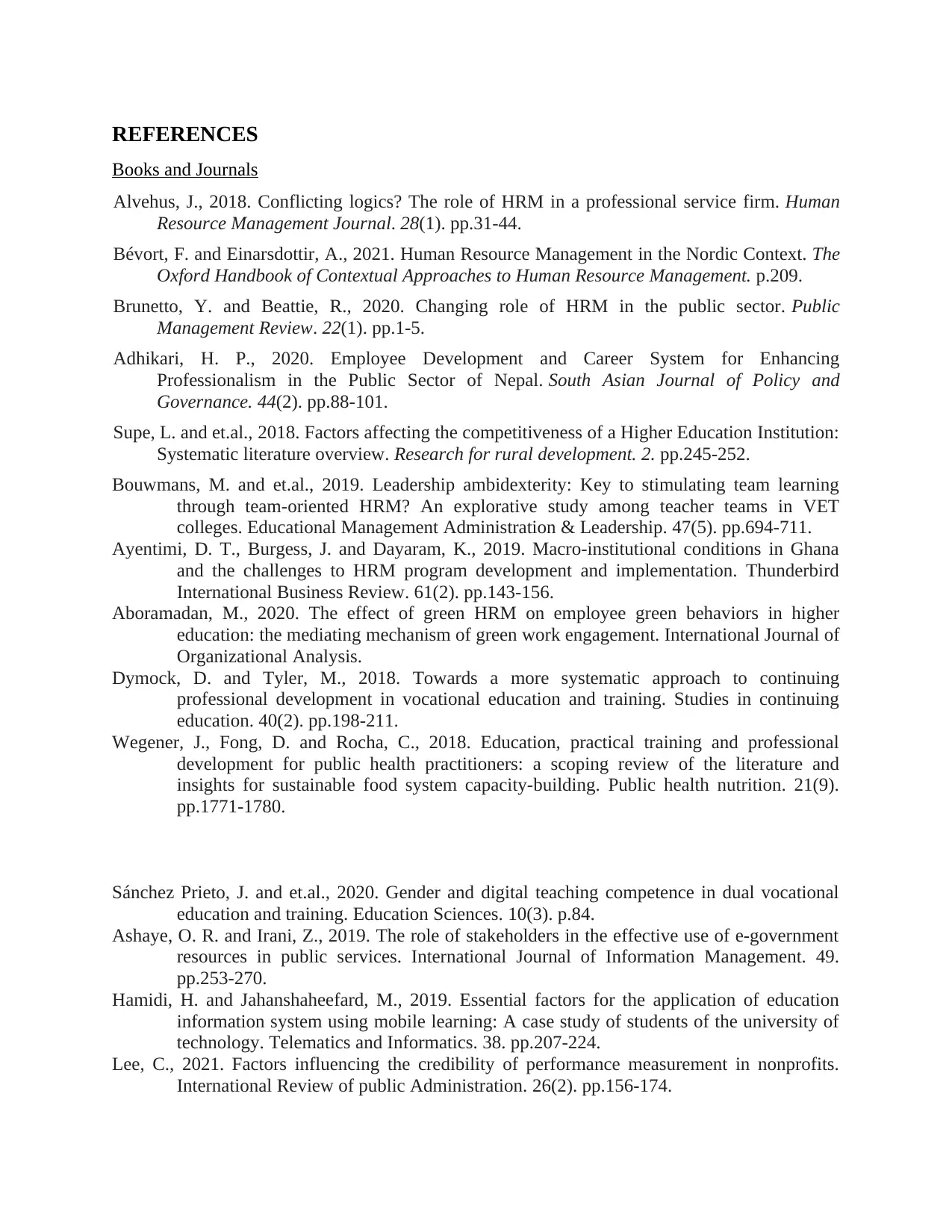
REFERENCES
Books and Journals
Alvehus, J., 2018. Conflicting logics? The role of HRM in a professional service firm. Human
Resource Management Journal. 28(1). pp.31-44.
Bévort, F. and Einarsdottir, A., 2021. Human Resource Management in the Nordic Context. The
Oxford Handbook of Contextual Approaches to Human Resource Management. p.209.
Brunetto, Y. and Beattie, R., 2020. Changing role of HRM in the public sector. Public
Management Review. 22(1). pp.1-5.
Adhikari, H. P., 2020. Employee Development and Career System for Enhancing
Professionalism in the Public Sector of Nepal. South Asian Journal of Policy and
Governance. 44(2). pp.88-101.
Supe, L. and et.al., 2018. Factors affecting the competitiveness of a Higher Education Institution:
Systematic literature overview. Research for rural development. 2. pp.245-252.
Bouwmans, M. and et.al., 2019. Leadership ambidexterity: Key to stimulating team learning
through team-oriented HRM? An explorative study among teacher teams in VET
colleges. Educational Management Administration & Leadership. 47(5). pp.694-711.
Ayentimi, D. T., Burgess, J. and Dayaram, K., 2019. Macro‐institutional conditions in Ghana
and the challenges to HRM program development and implementation. Thunderbird
International Business Review. 61(2). pp.143-156.
Aboramadan, M., 2020. The effect of green HRM on employee green behaviors in higher
education: the mediating mechanism of green work engagement. International Journal of
Organizational Analysis.
Dymock, D. and Tyler, M., 2018. Towards a more systematic approach to continuing
professional development in vocational education and training. Studies in continuing
education. 40(2). pp.198-211.
Wegener, J., Fong, D. and Rocha, C., 2018. Education, practical training and professional
development for public health practitioners: a scoping review of the literature and
insights for sustainable food system capacity-building. Public health nutrition. 21(9).
pp.1771-1780.
Sánchez Prieto, J. and et.al., 2020. Gender and digital teaching competence in dual vocational
education and training. Education Sciences. 10(3). p.84.
Ashaye, O. R. and Irani, Z., 2019. The role of stakeholders in the effective use of e-government
resources in public services. International Journal of Information Management. 49.
pp.253-270.
Hamidi, H. and Jahanshaheefard, M., 2019. Essential factors for the application of education
information system using mobile learning: A case study of students of the university of
technology. Telematics and Informatics. 38. pp.207-224.
Lee, C., 2021. Factors influencing the credibility of performance measurement in nonprofits.
International Review of public Administration. 26(2). pp.156-174.
Books and Journals
Alvehus, J., 2018. Conflicting logics? The role of HRM in a professional service firm. Human
Resource Management Journal. 28(1). pp.31-44.
Bévort, F. and Einarsdottir, A., 2021. Human Resource Management in the Nordic Context. The
Oxford Handbook of Contextual Approaches to Human Resource Management. p.209.
Brunetto, Y. and Beattie, R., 2020. Changing role of HRM in the public sector. Public
Management Review. 22(1). pp.1-5.
Adhikari, H. P., 2020. Employee Development and Career System for Enhancing
Professionalism in the Public Sector of Nepal. South Asian Journal of Policy and
Governance. 44(2). pp.88-101.
Supe, L. and et.al., 2018. Factors affecting the competitiveness of a Higher Education Institution:
Systematic literature overview. Research for rural development. 2. pp.245-252.
Bouwmans, M. and et.al., 2019. Leadership ambidexterity: Key to stimulating team learning
through team-oriented HRM? An explorative study among teacher teams in VET
colleges. Educational Management Administration & Leadership. 47(5). pp.694-711.
Ayentimi, D. T., Burgess, J. and Dayaram, K., 2019. Macro‐institutional conditions in Ghana
and the challenges to HRM program development and implementation. Thunderbird
International Business Review. 61(2). pp.143-156.
Aboramadan, M., 2020. The effect of green HRM on employee green behaviors in higher
education: the mediating mechanism of green work engagement. International Journal of
Organizational Analysis.
Dymock, D. and Tyler, M., 2018. Towards a more systematic approach to continuing
professional development in vocational education and training. Studies in continuing
education. 40(2). pp.198-211.
Wegener, J., Fong, D. and Rocha, C., 2018. Education, practical training and professional
development for public health practitioners: a scoping review of the literature and
insights for sustainable food system capacity-building. Public health nutrition. 21(9).
pp.1771-1780.
Sánchez Prieto, J. and et.al., 2020. Gender and digital teaching competence in dual vocational
education and training. Education Sciences. 10(3). p.84.
Ashaye, O. R. and Irani, Z., 2019. The role of stakeholders in the effective use of e-government
resources in public services. International Journal of Information Management. 49.
pp.253-270.
Hamidi, H. and Jahanshaheefard, M., 2019. Essential factors for the application of education
information system using mobile learning: A case study of students of the university of
technology. Telematics and Informatics. 38. pp.207-224.
Lee, C., 2021. Factors influencing the credibility of performance measurement in nonprofits.
International Review of public Administration. 26(2). pp.156-174.
⊘ This is a preview!⊘
Do you want full access?
Subscribe today to unlock all pages.

Trusted by 1+ million students worldwide
1 out of 13
Related Documents
Your All-in-One AI-Powered Toolkit for Academic Success.
+13062052269
info@desklib.com
Available 24*7 on WhatsApp / Email
![[object Object]](/_next/static/media/star-bottom.7253800d.svg)
Unlock your academic potential
Copyright © 2020–2026 A2Z Services. All Rights Reserved. Developed and managed by ZUCOL.


